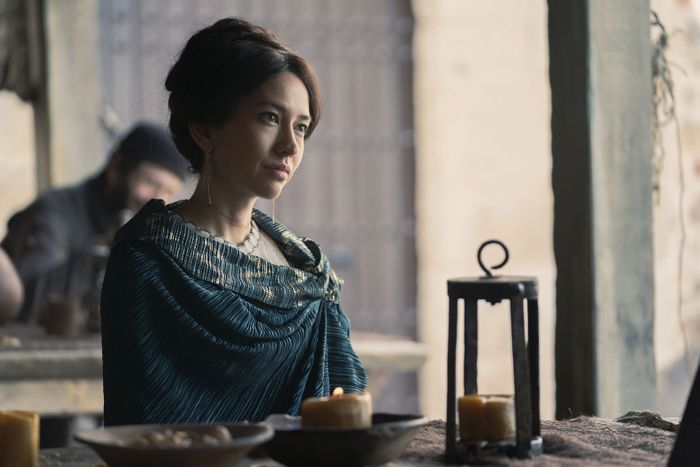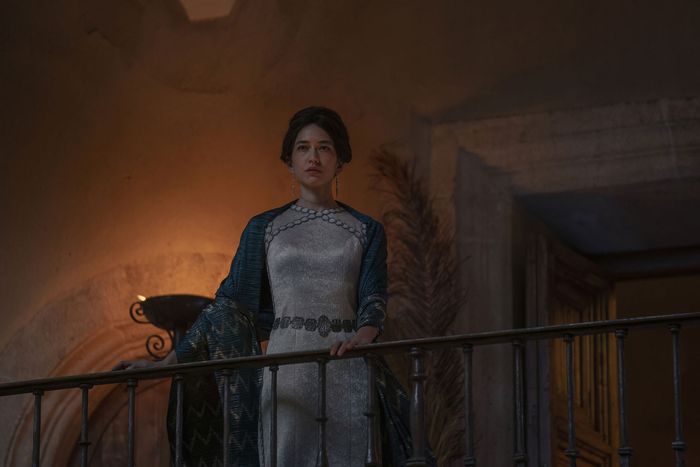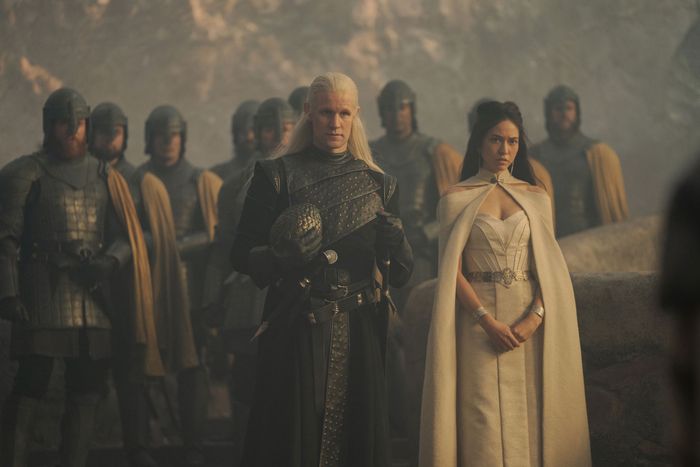
Spoilers follow for House of the Dragon through episode nine, “The Green Council,” and George R. R. Martin’s book Fire & Blood.
House of the Dragon episodes have a tendency to leave their final moments somewhat vague. Questions lingered after both Laenor’s flight in “Driftmark” and King Viserys’s obsession with prophecy in “The Lord of the Tides,” and to its credit, “The Green Council” switches things up, timing wise. This penultimate episode’s incomprehensible scene comes about midway through, when Mysaria, Daemon’s former lover and now a formidable spymaster in King’s Landing, is seemingly burned to death at the behest of Larys Strong. All the whispers swirling around have built to the whoosh of a roaring flame, and Mysaria might be the latest victim of that inferno.
Before that fire breaks out, Larys offers to commit this murder to Alicent, who compensates him in an early version of wikiFeet. We’ve already seen just how far Larys will go in the name of his queen, so we’re certainly meant to believe Mysaria at least could be dead. (If it didn’t click for you that the stone building torched 46 minutes into the episode is Mysaria’s, that upper-level balcony where we saw her standing in “The Lord of the Tides” is the architectural giveaway.) But narrative-wise, can we really assume that Mysaria, a character who in the books was a major player in the Dance of Dragons but onscreen hasn’t yet amounted to much more than a garish accent, is off the board?
As House of the Dragon has mostly focused on the backstabbing and maneuvering between the Targaryens, Hightowers, Velaryons, Small Council, and other major houses, common folk have lacked a voice on the series. That’s mostly in line with this universe; recall how Game of Thrones, in presenting the perspective of the ruling class, treated regular Westerosi people like an afterthought, save for Dany’s desire to “break the wheel.” And much like Game of Thrones elevating sex worker Shae to Tyrion Lannister’s side so she could voice an outside perspective and provide valuable insight about manipulating other people’s desires, House of the Dragon plopped Sonoya Mizuno’s Mysaria next to Daemon. After introducing her in “The Heirs of the Dragon” as someone aware of Daemon’s incestuous tendencies (“I could even arrange one with silver hair” she says when he struggles to perform, one of the series’s more curiously abandoned character quirks), Mysaria then nearly becomes Daemon’s second wife in “The Rogue Prince.”
But when Mysaria realizes that Daemon is using her — lying about her pregnancy and his intentions to take her as a second wife so he can steal a dragon egg and take up residence on Dragonstone, away from his wife in the Eyre — she abandons him. In a very cringey echo of how Game of Thrones initially presented Dany as the welcome savior of Slaver’s Bay, Mysaria chastises Daemon for putting her in harm’s way by dragging her into his conflict with his brother: “I have been sold as property more times than I care to count, beginning in a homeland I can no longer recall. Most of my years have been spent living in terror. … I didn’t come into your service wanting gold or power or station. I came to you to be liberated [from] fear.”
This speech would probably have more impact if Mizuno weren’t delivering it with the most mystifyingly discordant accent heard in this franchise since the Sand Snakes embarrassment, and if Mysaria’s characterization went deeper than a foreigner who sincerely believed a Targaryen had her best interests at heart. Why would a hardened sex worker be tricked into thinking this in the first place? I refuse to believe that Daemon was actually that charming; he hadn’t even become a war hero yet!
Maybe this early presentation is so that the Mysaria we meet again in “The Lord of the Tides” as spymaster the White Worm can be understood as someone working outside the boundaries of official power, who wants to make a difference through information and access. That’s at least a little more depth than George R. R. Martin gave her in Fire & Blood, in which “pale stranger” Mysaria reappears after the war has already started. But there’s a disconnect in “The Green Council” between how Mysaria is supposed to be canny, clever, and cunning, and why she would once again believe a high-born man’s promise of better behavior. (The subplot involving Mysaria asking Otto to help stop a children’s fighting ring is created by the show, and separate from the source material.)
Once Grandpa Otto Hightower has Aegon in hand and has made him the new king, what need does he have to shut down the fighting pits — and, it’s implied, brothels — that enslave children in Flea Bottom? What leverage would Mysaria have over him after that point? And why would Mysaria, who once told Daemon of the succession struggle, “You can afford to play your stupid games with the King, but I cannot,” get in the middle of another stupid game between Otto and Alicent? Hubris, perhaps, built up after what Larys implies is 15 or so years of web-weaving in the Red Keep. But wouldn’t Mysaria, more than anyone, know that Aegon the Elder (entitled, lazy, leaving bastards all over the place) is unfit for rule? Why not try to negotiate with Alicent, too?
Not unlike Rhaenys threatening the royal family and then just flying away without taking any action, Mysaria choosing to relinquish Aegon feels like an out-of-character decision that contradicts how tactically minded and forward-thinking we’re led to believe these women are. Mysaria’s personal opportunism doesn’t quite jibe with her new class consciousness, and the resulting character seems less slippery by design than convoluted by necessity.
All of this leads us back to the question raised by that scene in “The Green Council”: Is Mysaria dead? Even though House of the Dragon has increasingly deviated from Fire & Blood, this change would be a surprising one. In the source material, Mysaria is majorly involved in the war between the greens and the blacks, and the rivalry between her and Larys should only heat up from here. It would make more sense if the fire that was intended as murder ends up an unintentional warning, one that causes Mysaria to go underground and then emerge back into the story with additional character development that justifies her Lady Misery moniker. (Any additional motivation and contextualization for Mysaria would be welcome, although I am wary of any time jumps that might be involved.) Recall Helaena Targaryen’s fixation with spiders, and her ability to foresee “the beast beneath the boards”: Mysaria still has another web to weave, and hopefully House of the Dragon gives Mizuno more to do as she gets to spinning.




